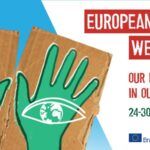The Commission and the High Representative adopted the Youth Action Plan in the European Union external action for 2022-2027, the first-ever policy framework for a strategic partnership with young people around the world to build a more resilient, inclusive and sustainable future. It will help deliver on international commitments, such as the United Nation’s 2030 Agenda for Sustainable Development and the Paris Climate Agreement, by enhancing meaningful youth participation and empowerment in the EU’s external action policies.
The Youth Action Plan in EU External Action is guided by three pillars of action that will help shape the EU’s partnership with young people in partner countries:
- partnership to engage: increasing young people’s voices in policy and decision-making;
Young people demand and deserve a comprehensive approach to ensure meaningful, inclusive and effective youth participation. The EU is committed to increasing the voice and leadership of young people worldwide, in particular young women and girls, youth activists and organisations, at all levels of governance, from domestic politics to multilateral forums, and within EU policy-making processes.
- partnership to empower: fighting inequalities and providing young people with the skills and tools they need to thrive;
Young people are empowered when their voices are heard and the inequalities that affect their lives are tackled. The EU will continue its support to transform education worldwide not least through Global Gateway investments, to improve young people’s access to economic opportunities, strengthening young people’s capacity to contribute to sustainable development and drive the green and digital transitions across the world, and for young people’s health, mental and physical well-being and access to sexual and reproductive health and rights. The EU will continue paying a particular attention to children and young people living in conflict settings.
- partnership to connect: fostering opportunities for young people to network and exchange with their peers worldwide.
The EU aims to promote youth mobility, exchanges and networking as an essential aspect of the people-to-people dimension of the Global Gateway strategy. The goal is to ensure diversity and inclusiveness, while paying special attention to social and economic barriers, the digital divide and risks related to disinformation.
The Youth Action Plan in EU External Action will reinforce ongoing initiatives and launch new key initiatives targeting young people worldwide including:
- The Youth and Women in Democracy Initiative worth €40 million will increase the voice and leadership of young people, youth activists and youth-led organisations across the world, by strengthening their rights, empowerment, and participation in public and political affairs. The initiative will support grassroots organizations and young activists in the institutional oversight, anti-corruption, citizen election observation, democratic reform advocacy, civil education, promotion of the right to vote, freedom of association and assembly and human rights.
- The Youth Empowerment Fund is a new pilot initiative worth €10 million that will provide direct financial support to youth-led initiatives in partner countries focusing on the implementation of the Sustainable Development Goals at local level, in particular on environment and climate change and the inclusion of vulnerable and marginalised youth.
- The Africa-Europe Youth Academy will channel financial support of €50 million to formal and informal learning opportunities and exchanges for young people willing to improve their leadership skills and create networks of change-makers in Africa.
The Youth Action Plan is part of the EU institutions efforts to mark the European Year of Youth 2022 and its international dimension, shining a light on the important role of young people in building a better future – greener, more inclusive and digital.

EU innovation performance continues to improve
|
Background information
The Youth Action Plan is the result of extensive consultations with over 220 stakeholders across the world, in particular children’s rights and youth organisations. It responds to the legitimate demand by young people, also reflected in the outcomes of the Conference on the Future of Europe, to be involved in a more structured way in EU policy- and decision-making processes.
The Youth Action Plan strengthens the international dimension of the EU Youth Strategy and builds on the EU Strategy of the Rights of the Child.
It draws on the EU Action Plan on Human Rights and Democracy that stresses the need for equal, full and meaningful participation of young people in public and political life, and the European Pillar of Social Rights. Finally, it implements the EU Gender Action Plan (GAP) III, by focusing on the empowerment of girls and young women.
A report on youth related indicators and its accompanying dataset by the Commission Joint Research Centre (JRC) contributes to the evidence-based approach to the Youth Action Plan. It offers a map of international data on youth across a series of main thematic areas and make recommendations to all stakeholders working on youth towards greater coherence.
The Youth Action Plan will also support the implementation of the UN Youth, Peace and Security Agenda and the role of young people in building lasting peace, contributing to justice and reconciliation and countering violent extremism.
More information: Press release – European Commission







Leave a Reply